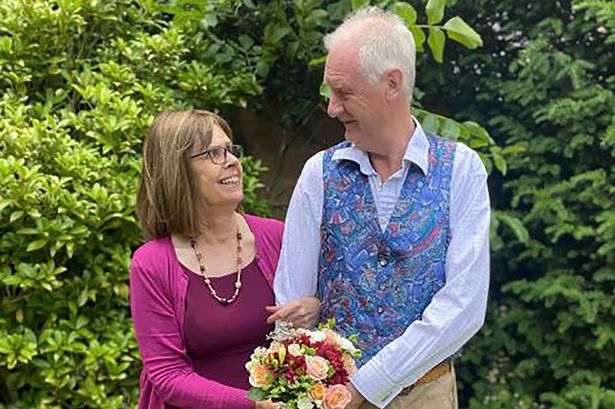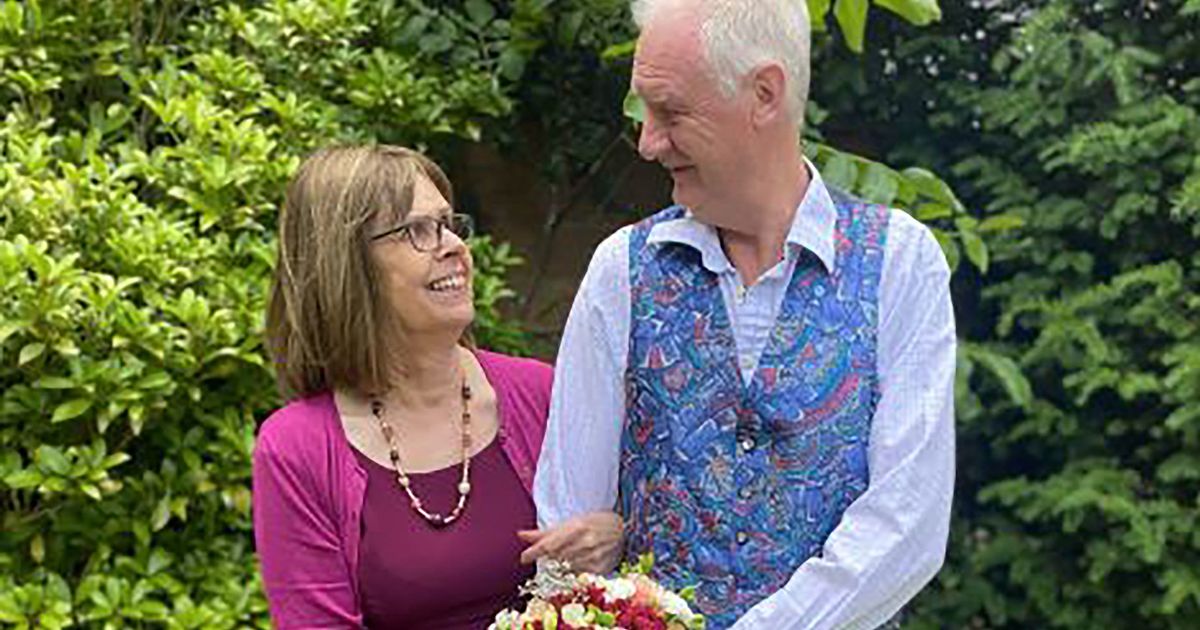Stephen Burch and Katherine Burch, both 65, both died at the scene after suffering multiple injuries in the crash on August 28, 2024. Humphrey Pickering, who lost control of his car, also died in the tragic incident. Reverend Stephen Burch and his wife Katherine, who died in a crash in Beaumaris, Anglesey, on August 28, 2024(Image: PA)
Reverend Stephen Burch and his wife Katherine, who died in a crash in Beaumaris, Anglesey, on August 28, 2024(Image: PA)
An 81-year-old motorist pressed his accelerator pedal “in error” and hit a retired couple at high speed, an inquest has heard.
Stephen Burch and Katherine Burch, both 65, had no time to react as Humphrey Pickering failed to negotiate a sharp bend and lost control of his powerful Audi A8 automatic car.
The former vicar and charity worker, from Alcester, Warwickshire, both suffered multiple injuries and were pronounced dead at the scene of the collision in the popular North Wales seaside town Beaumaris.
Ex-librarian Mr Pickering, from Colwyn Bay, also died at the scene in Alma Street, as his car went on to collide with the front of a house on the afternoon of August 28 last year.
He was not wearing his seat-belt and sustained fatal chest injuries.
Caernarfon Coroner’s Court heard that Mr Pickering had earlier tried to pull slowly out of a tight parking space off the seafront near to the Bulkeley Hotel, to allow enough room for his wife, Margaret, to get into the vehicle’s passenger side.
An eyewitness told the court the grey Audi suddenly “lurched forward” and the driver “appeared to panic” before the car “shot off down the road”.
CCTV footage showed the Audi initially accelerate “abruptly” into a group of four pedestrians, knocking down two people who escaped with minor injuries.
Meilir Hywel, forensic collision investigator for North Wales Police, said Mr Pickering’s car continued to accelerate on Alma Street and narrowly missed colliding with two vehicles.
Mr Pickering then lost control of the Audi on a 90 degrees right bend.
Pre-crash data recovered from the vehicle showed the accelerator pedal was repeatedly pressed and the brake pedal was not activated.
The Audi reached a speed of 55mph, in a 20mph zone, in the seconds before the collision, the court heard.
Mr Hywel concluded the sudden acceleration was because of “pedal misapplication in applying the accelerator instead of the brake pedal in error”.
He said: “He was then unable to correct his error while driving a powerful vehicle.”
One of Mr and Mrs Burch’s three children, Sarah Packwood, told the inquest her parents were both of “deep Christian faith”.
Her mother was a talented musician and baker who “always put others first” and was “passionate about serving her community”, while her father “actively shared his faith throughout his life” and was an “avid sports fan”.
She said her family has raised concerns about the age of Mr Pickering and his ability to drive a brand new powerful vehicle.
Mr Pickering’s daughter, Helen Baxter, said the father-of-two was an “active member of the community” who was “out in the garden every day in all weathers” and had “good” mental agility.
She said Mr Pickering was a librarian in Oldham before he set up his own business in automated library services, which led to him working around the world.
She said he had five holidays booked for 2024 “which was normal for him as he loved to travel”.
Why we cover inquests – and why it’s so important that we do
As painful as these proceedings are for those who have lost a loved one the lessons that can be learned from inquests can go a long way to saving others’ lives.
The press has a legal right to attend inquests and has a responsibility to report on them as part of their duty to uphold the principle of open justice.
It’s a journalist’s duty to make sure the public understands the reasons why someone has died and to make sure their deaths are not kept secret. An inquest report can also clear up any rumours or suspicion surrounding a person’s death.
But, most importantly of all, an inquest report can draw attention to circumstances which may stop further deaths from happening.
Should journalists shy away from attending inquests then an entire arm of the judicial system is not held to account.
Inquests can often prompt a wider discussion on serious issues, the most recent of these being mental health and suicide.
Editors actively ask and encourage reporters to speak to the family and friends of a person who is the subject of an inquest. Their contributions help us create a clearer picture of the person who died and also provides the opportunity to pay tribute to their loved one.
Often families do not wish to speak to the press and of course that decision has to be respected. However, as has been seen by many powerful media campaigns, the input of a person’s family and friends can make all the difference in helping to save others.
Without the attendance of the press at inquests questions will remain unanswered and lives will be lost.
Senior coroner for north-west Wales, Kate Robertson, said she was satisfied the “most likely explanation” for the collision was the “pedal misapplication which has led to a sudden and unintended acceleration”.
She told both families: “There are no words that I can say that will ease the pain and suffering you will no doubt be feeling, have felt and will continue to feel, but you have all acted with huge dignity.
“I am incredibly sorry for your loss in these tragic circumstances.”
